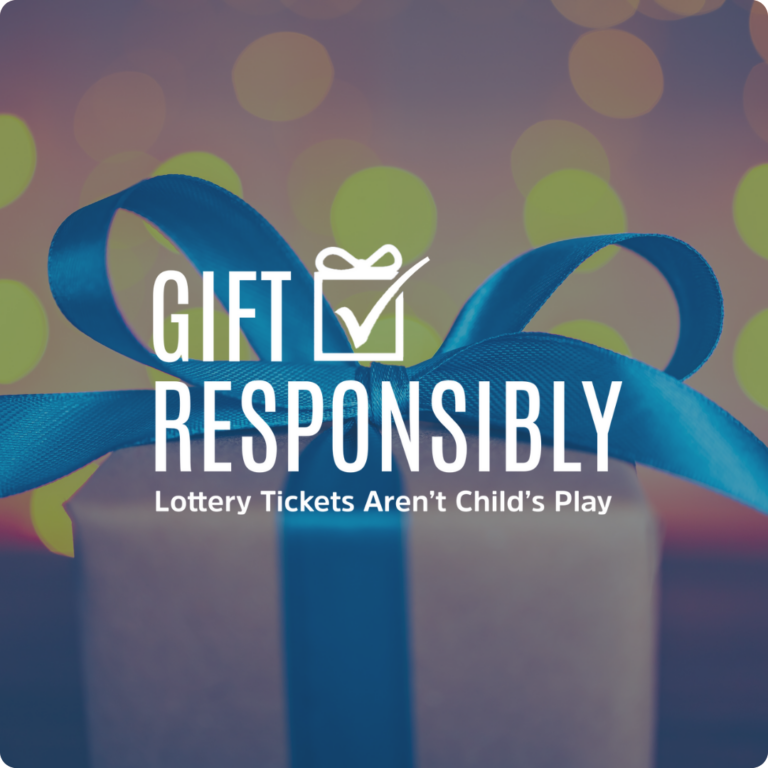Gift Responsibly Campaign
Participants of the Gift Responsibly Campaign work to educate communities about the dangers of gifting lottery tickets to children, raise awareness about the risks of youth gambling and promote responsible gambling practices for those of legal age who choose to gamble.
About the Gift Responsibly Campaign
Founded in the early 2000s, the Gift Responsibly Campaign works to raise public awareness about the risks of youth gambling. Through partnerships with lotteries and other organizations, the campaign educates communities about the risks of buying lottery tickets for children.
The campaign is presented by NCPG and supported by NASPL.
Campaign Goals
- Educate communities on the dangers of buying lottery tickets for children.
- Raise awareness about the risks of youth gambling.
- Support responsible gambling practices while remaining neutral about legalized gambling.
Register to Participate in the 2024 Gift Responsibly Campaign
In 2023, more than 150 lotteries and community organizations from around the world participated in the Gift Responsibly Campaign. Join your colleagues around the world by participating in the Gift Responsibly Campaign and raising awareness about the risks of underage lottery use.

Campaign Participation Levels
Campaign Toolkit
The Gift Responsibly Campaign toolkit provides the tools necessary to help share campaign messaging in a unified voice. Participants are encouraged to use this toolkit to help prepare your ads, social media posts, print collateral and more.
Already registered as a participant? Click Here.
Campaign FAQs
The Gift Responsibly Campaign was founded in the early 2000’s and works to raise public awareness about the risks of youth gambling. Through partnerships with lotteries and other organizations, including past partnership with the International Centre for Youth Gambling Problems and High-Risk Behaviors at McGill University, the campaign is designed to educate communities about the risks of buying lottery tickets for children.
The campaign is presented by the National Council on Problem Gambling (NCPG) and supported by NASPL.
Campaign participants are provided with materials and messaging for lotteries and non-lottery organizations to communicate responsible gambling around the winter holidays and all year long.
In 2021, the campaign theme changed to a general Gift Responsibly message. While the campaign continues to focus on the holiday season, the name change enables lotteries to expand the responsible giving messaging for all the occasions where children might receive lottery tickets as gifts (e.g., birthdays, graduations, etc.).
The Gift Responsibly Campaign is primarily designed for lotteries. However, any organization that commits to help educate its stakeholders on the importance of gifting responsibly is also welcome to participate.
For the last five years, 100% of all eligible U.S. and Canadian lotteries have participated in the Campaign. They were joined by a number of international lottery and non-lottery organizations.
No, NCPG Membership is not required to participate in the Gift Responsibly Campaign.
However, organizations that are not currently NCPG Members are encouraged to join to broaden their knowledge in problem gambling and responsible gambling.
To participate in the Gift Responsibly Campaign, organizations can register online.
There are several levels of engagement for lotteries and other organizations, making it easier for organizations to commit to the level that’s most suitable for them.
Research shows that the earlier a person’s participation or even exposure to gambling is in childhood, the more likely they are to develop a gambling problem later in life. Gambling exposure during childhood is often through some kind of lottery product, given by an adult who is likely unaware of the associated risks.
Your organization’s participation in the Gift Responsibly Campaign will help to raise awareness about the risks of underage lottery use. Whether or not it is legal for minors to participate in lottery games in your area, a responsible gambling message is always appropriate.
This campaign was previously known as the Holiday Lottery Responsible Gambling Campaign. The name was changed in response to requests from lottery organizations and feedback from our global stakeholders.
The new name enables lotteries all over the world to participate. It avoids the word ‘holiday,’ which in many global cultures describes what American English speakers might call ‘vacation.’ It provides flexibility to expand the responsible giving message for all the occasions where children and minor teens might receive lottery tickets as gifts throughout the year.
The campaign is presented by the National Council on Problem Gambling (NCPG) with support from NASPL. It also receives endorsements from the World Lottery Association (WLA) and European Lotteries (EL).
Youth problem gambling is a growing public health concern. Even though gambling activities are legally restricted to adults, and laws for purchase, play, and redemption vary by state, province, and territory, there is clear evidence that underage youth continue to actively participate in gambling.
- Many young people report their first gambling experience occurs around 9-11 years of age.
- Approximately 60 percent of high-school-aged adolescents report having gambled for money during the past year.
- Ten to 14 percent of adolescents are at-risk for developing a problem with gambling.
- While male adolescents gamble more frequently than females, female adolescents are more actively involved in lottery play.
- Four to six percent of adolescents presently have a serious problem with gambling. Putting it into perspective, adult gambling disorder prevalence rates are about one to two percent of the population.
